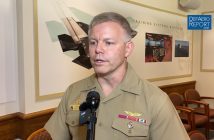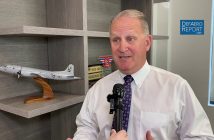Mauricio Meschoulam, PhD, professor at Universidad Iberoamericana Mexico and founder of the Mexico Research Center for Peace, discusses how to tackle Latin America’s security challenges that are driving migration caravans to the United States with Defense & Aerospace Report Editor Vago Muradian. Our coverage was sponsored by L3 Technologies and Leonardo DRS.
Mauricio Meschoulam
President, Ibero-American University
Mexico Research Institute for Peace
Halifax International Security Forum
November 2018
Vago Muradian: Welcome to the Defense and Aerospace Report. I’m Vago Muradian here at the Halifax International Security Forum in Nova Scotia, Canada, one of the world’s leading gatherings of military, defense, diplomacy, economics and civil society leaders from around the world. Our coverage here on this 10thanniversary of this great conference is sponsored by L3 Technologies and Leonardo DRS, and we’re talking to Mauricio Meschoulam who is from the Mexico Research Institute for Peace, also with the Ibero-American University. It’s always a pleasure. We get a chance once a year to talk here at the forum.
There are a lot of headlines, obviously, in the United States about the caravan and about migration and illegal migration in particular. The President has called it an invasion and there are U.S. troops, active duty troops deployed in the United States. We’ve heard Jim Mattis compare it to the Pancho Villa deployment. That raised a little bit of eyebrows for anybody who knows the history and the difference between the two groups.
Talk to us fundamentally, Mauricio, about what’s driving this stream of immigration and why people are forming into these caravans in the first place.
Dr. Mauricio Meschoulam: Okay. Let me try to be as short as possible. Migration has structural factors and it also has immediate drivers that are all of them together.
The structural factors are expulsion factors and attraction factors. So you have a number of crises all together, going on in Honduras and a number of attraction factors in the U.S. So you have, for example, the political situation in Honduras and the violent situation in Honduras. But there is also an economic incentive. You cannot divorce all these factors altogether because there is demand and there is supply, and there is, you know, demand of drugs and there is supply of drugs and there is violence driven by this supply and demand of drugs and the money that goes behind all that. So you have to look at it as an ecosystem where the migrants are only part of this big, big, huge system.
Now, of course, why are they joining together in caravans? This is, the last one is not the first caravan. It is the biggest caravan but is not the first one. Why are they joining in caravans? Basically because they, one, they need to face a number of problems throughout the way. For example, the drug cartels that kidnap some of them, unfortunately, during their path. So when they are together they are as a group, they walk together and they are a little safer. Also, they grab the attention from different organizations and different groups that support them throughout the way.
And they’re also a political force. Because if you are alone and you want to cross as opposed to if you are as a group, you have a political strength to cross into what is your goal, to be in the U.S.
Now they are not criminals. They are migrants. They want to work. Of course, in doing so they are opposing different forces and different political forces, but this is mostly the situation.
Mr. Muradian: Do you, what is the right way for the region and for the United States to help address some of these underlying factors? There have been a lot of programs over many, many years that have tried to address this. You have gang violence, you have narco violence. Again, you have the attraction of being able to even at a low wage job to make much more than you’re going to be able to make at home legitimately so that one person comes here and supports one entire family back at home.
What’s the right way to approach this? Because if you add up interdiction costs, societal disruption costs, it’s a massive burden. It’s also a massive burden on Mexico. An extreme disruption for Mexico and its economy as well.
Talk to us about what the right approach to this is, as somebody who’s been studying ways to actually address and solve the problem.
Dr. Meschoulam: Funny we are discussing this because this is a global phenomenon. It’s not only Central America or North America. It’s actually global. And there is, unfortunately, no easy way to solve migration. Migration is something that is going to stay with us for a while.
But if you would want to approach it, you would have to develop short-term, mid-term, and long-term policies that address the root factors, both attraction and expulsion factors. Which I’m not saying is easy, but you need to address what is driving the violence inside our countries. When I say our countries I also mean Mexico. Mexico, Guatemala, Honduras. What is driving this violence? What would you do in the short-term in the mid-term and in the long-term to tackle that violence altogether as a region, which is understand that it is a global issue? We must see together and address how would you reduce — I would turn the question. How would you reduce demand of drugs in the U.S.? How would you address that? You would have to because otherwise there will always be a market, and as long as there is a market there will always be violence in Mexico and Honduras and Colombia and all the producers and all the countries that move the drugs towards the supply, towards the demand. So you have supply, you have demand. How would you address that?
Of course, there is no easy solution to tackle demand of drugs, as there is no easy solution to resolve the gap between our countries, the economic gap between our countries.
For example, you wouldn’t have to solve poverty in Honduras, you would have to solve, to shorten the gap, to make it more costly for a migrant to want to go — if you earn ten times as much as you earn in your country you will have an incentive. So how would you reduce that gap?
You, of course, need investment programs, regional programs, and you would have to address it in the long term. There is no easy way to solve it, I’m afraid to tell you that.
Mr. Muradian: And it’s funny that as you were talking about that, El Chapo Guzmán is actually in court in the U.S. in New York, in fact, for his prosecution.
Is there a sense about how much, why is it the governments are having such a hard time being able to address some of these challenges within their own borders? Whether it’s for law enforcement, whether it’s for economic development. You know, what are some of the reasons that, for example, the countries themselves can’t handle?
Dr. Meschoulam: Because the institutions are not strong. You have what is called the fragmented states. It’s a better term than saying failed states because we are not completely failed states. You can say it’s a fragmentation. There are many regions inside our countries where you cannot find the respect for law, or you don’t have strong institutions for law enforcement. You have the economic disruption in different regions and then you have the violence of the criminal gangs. So you have a number of problems that make it difficult.
Of course great corruption. The corruption behind all these areas that I’m talking about. So you would have to actually, again, design short and mid-term and long-term policies to try to tackle those factors from the root.
Mr. Muradian: So if you’re talking, briefly, what would be a short-term, mid-term, long-term — if you had the Meschoulam plan, what would that Meschoulam plan look like?
Dr. Meschoulam: Focalized programs. You would have to detect the areas most disrupted by migration and organized crime and do focalized programs, regional programs. I mean short-term programs because you can address a specific region. Of course, if you don’t do the mid-term solution then the problem will only move. But for a short-term policy you can address one region, one specific region, try to push investment there, try to develop different programs. You know, sports programs, education programs, altogether.
Mr. Muradian: Manufacturing?
Dr. Meschoulam: Manufacturing. You know, investment in general, but thinking as a region, not leave it to Honduras, they must do this. We have to focus, including Mexico of course. Mexico also understanding that it has a problem. Not all the problem comes to the U.S. Much of the problem stays in Mexico and Mexicans are also violating human rights. We have to recognize that and we have to address that. Because you cannot only act with police with these migrants. And sometimes they are not respected as the dignity of people that they are trying to look for better places. So you would have to, you know, think of short-term ideas that you could pull. Also regarding the U.S., you would have to deal with the fact that these migrants are coming to the border. What are you going to do?
Of course, you can build a wall, but they will find ways. They will solve the problem. As long as there is demand, they will solve the problem of crossing the border.
So how would you deal with these migrants in the short term? What would you do to try to be human, to try to be compassionate, but also to try to address the problem?
We were discussing about this with Germany, for example. Germany decided to receive about a million refugees, and of course it had consequences. It had political consequences. We understand that. So how would you address all that? We have to think of these issues as a region and actually as a globe.
Mr. Muradian: You mentioned the impact on Mexico which is something that people don’t necessarily register or consider, right? There are a lot of people who say well why don’t they just stop in Mexico, the caravan? Talk to us about the impact on the Mexican political system, the economy. You said there is violations of human rights that are happening in Mexico, even though there are many Mexicans who have opened their homes and their wallets in order to support people who are coming on these journeys with food, water, and anything else. Even people who actually can least afford it have often done the most. What’s the burden and the stresses that all of this puts on Mexico?
Dr. Meschoulam: Right now the thing is that Mexico feels very threatened. This actually connects us to the other area which is trade and which is NAFTA. Mexico feels threatened by any Tweets from the U.S. President or any threats that, you know, the NAFTA, now called the USMCA, might be canceled or might be rethought. Because of that, Mexican authorities thought that the correct way to approach this caravan was to be tough. And because of that, the initial approach to the caravan was a very police-oriented approach and the Mexican society protested a lot. There was a huge political stress on the president, like come on, we cannot treat Hondurans as we complain that Mexicans are treated elsewhere.
So it creates political strains. But also the migrants, many of them cannot make the full trip. Many of them stay. And since they stay, they create all the problems that big communities create when they are not stable in a certain place. And they create political issues, minor political issues, local political issues in their places. So it becomes also a problem for Mexico. What do we do with these migrants when we also have a similar problem of Mexicans, not necessarily refugees, Mexican migrants who go for economic reasons to travel to other countries such as the U.S.? Not only the U.S., but like the U.S.
So it creates a huge problem for the Mexican authorities as well.
Mr. Muradian: Talk to us about the new trade agreement and what it means from a Mexican standpoint. Is it good? Is it bad? Is it neutral? And how will the new president and is the new president dealing with it?
Dr. Meschoulam: Let me start by saying that Mexico was actually in panic, in panic just to think of the possibility that there would not be a renewed NAFTA.
Mr. Muradian: I know, we talked about that last year and the year before that.
Dr. Meschoulam: And I was telling you, that’s a bad way to start a negotiation. Because if we are going to negotiate and you perceive that I’m in panic for not reaching a deal, you will have the upper hand, and that’s how Mexico negotiated.
Now what we as Mexicans got from the USMCA, it’s secondary because finally, we got a deal and you can tell investors that you will still have the most important of it. And the most important of it, more than the rules and more than the specifics which I’m not expert on, you can talk to a trade specialist on that. But what I can tell you is that more than the rules, the specifics on the deal, what remains there is a framework for doing investments and business with Mexico, because Mexico, as I said, is a very corrupt system. But as long as there is a set of rules that you know that Mexico will comply and the Mexican system will respect, then you are safe as an investor, and that remains. As long as that remains, the other part is secondary.
Of course we lost some in the negotiations and we could have possibly reached a better deal for Mexico, but in the end we reached a deal and it is very important to say that the outgoing administration of Mr. Pena Nieto agreed to this deal as well as the incoming administration of Andrés Manuel López Obrador, they both agreed on this deal. So you have, you could say that the strength of the deal is between the two presidents.
Mr. Muradian: And what should Washington and the region expect from the new president?
Dr. Meschoulam: The new president, well, that’s a very difficult question to ask. Because in the beginning you could say that the signals that the new president, the new incoming president was sending, the still president-elect was sending was reassuring signals that he was going to be pragmatic, that he was going to respect certain rules and certain conditions and relations, and that he understands the importance of the relationship between Mexico and the U.S. But for the past several weeks, the signals have been different. The signals have been that he is going to comply a number of campaign promises which include putting to consult different areas, and that might create a strain with the U.S. government.
So we’ll have to see. There is an internal fight between the pragmatists inside the government and you would say the more populist parts of the government, the incoming government.
So it will depend on how these parts negotiate internally so that you can have a specific outcome in the coming months.
Mr. Muradian: Mauricio Meschoulam of the Mexico Research Center for Peace. It’s always a pleasure Mauricio. Thanks very much.
Dr. Meschoulam: Thank you very much for the interview. Thank you so much.
30




